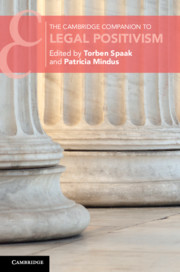Book contents
- The Cambridge Companion to Legal Positivism
- Cambridge Companions to Law
- The Cambridge Companion to Legal Positivism
- Copyright page
- Contents
- Figures
- Contributors
- Acknowledgements
- 1 Introduction
- Part I Fundamentals
- Part II History
- Part III Central Figures
- Part IV Main Tenets
- 17 Social-Practice Legal Positivism and the Normativity Thesis
- 18 Social Facts and Legal Facts: Perils of Hume’s Guillotine
- 19 The Scope of Legal Positivism: Validity or Interpretation?
- 20 What Is Law and What Counts as Law? The Separation Thesis in Context
- 21 The Origins of Inclusive Legal Positivism
- 22 Disruptive Implications of Legal Positivism’s Social Efficacy Thesis
- 23 The Semantic Thesis in Legal Positivism
- Part V Normativity and Values
- Part VI Critique
- Index
- References
20 - What Is Law and What Counts as Law? The Separation Thesis in Context
from Part IV - Main Tenets
Published online by Cambridge University Press: 21 January 2021
- The Cambridge Companion to Legal Positivism
- Cambridge Companions to Law
- The Cambridge Companion to Legal Positivism
- Copyright page
- Contents
- Figures
- Contributors
- Acknowledgements
- 1 Introduction
- Part I Fundamentals
- Part II History
- Part III Central Figures
- Part IV Main Tenets
- 17 Social-Practice Legal Positivism and the Normativity Thesis
- 18 Social Facts and Legal Facts: Perils of Hume’s Guillotine
- 19 The Scope of Legal Positivism: Validity or Interpretation?
- 20 What Is Law and What Counts as Law? The Separation Thesis in Context
- 21 The Origins of Inclusive Legal Positivism
- 22 Disruptive Implications of Legal Positivism’s Social Efficacy Thesis
- 23 The Semantic Thesis in Legal Positivism
- Part V Normativity and Values
- Part VI Critique
- Index
- References
Summary
Marmor considers the separation thesis, which he understands as saying that whether a given norm is legally valid depends on its sources, not its merits; and this means that he is concerned with the separation thesis conceived as a thesis about legal status, not as a thesis about the content of legal statements. Observing that the distinction between sources and merits is very close to the distinction between is and ought, he considers the objection that the separation thesis cannot be upheld because one cannot clearly distinguish between sources and merits, between is and ought. He responds to this objection, however, that the separation thesis can be upheld if it is seen as an answer to the question ‘What counts as law?’ rather than to the question ‘What is law?’, and that this response is in keeping with a common wish on the part of legal positivists to provide a reductive explanation of legal validity, that is, an explanation of legal validity exclusively in terms of social facts.
- Type
- Chapter
- Information
- The Cambridge Companion to Legal Positivism , pp. 465 - 486Publisher: Cambridge University PressPrint publication year: 2021
References
- 1
- Cited by



